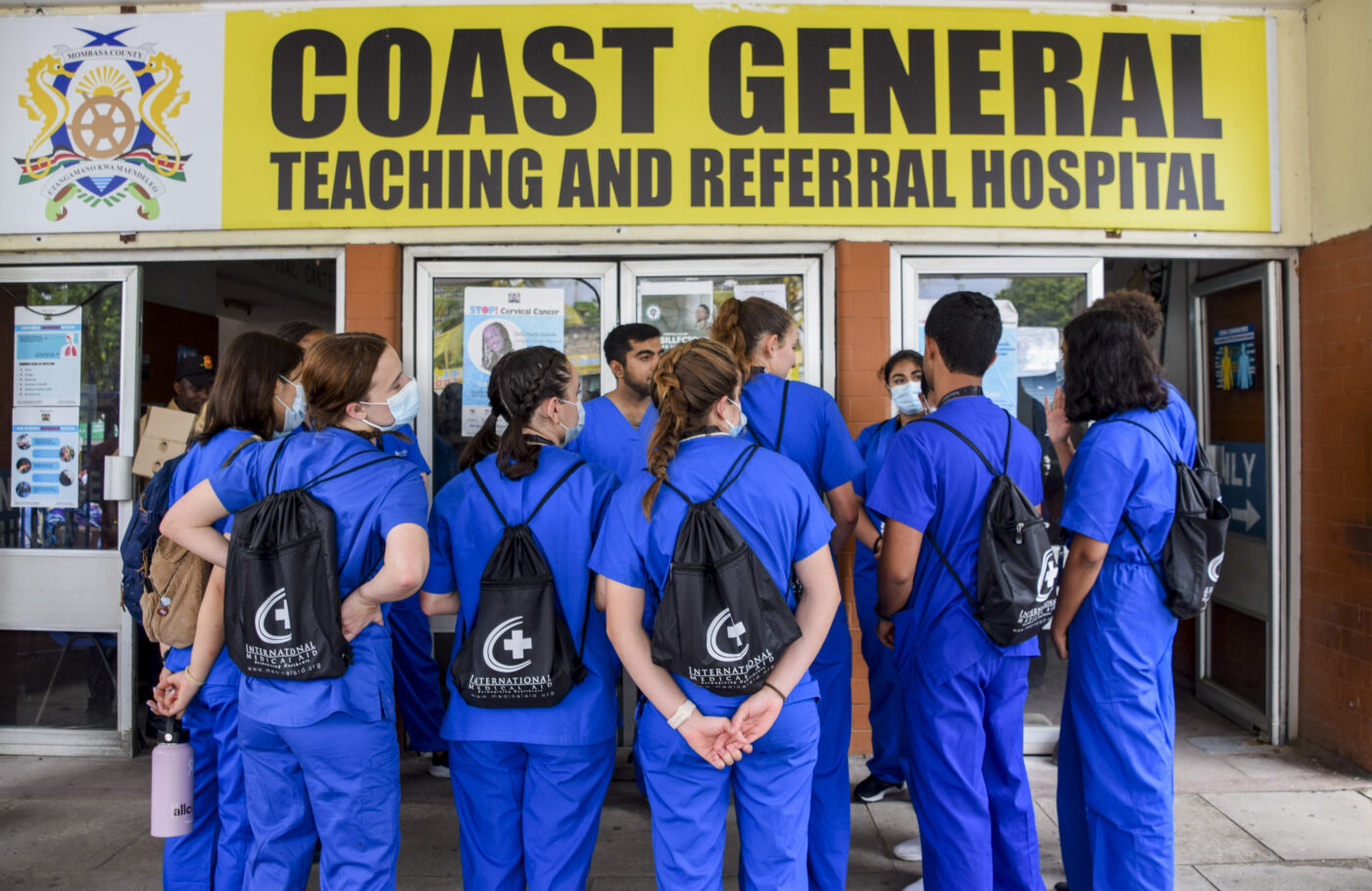Getting into medical school is no easy task. It’s a highly competitive process and even the slightest edge can make all the difference. So, should you get a graduate degree if you’re hoping to attend medical school?
We discuss how graduate school could help or hurt your application, which programs to look into, and alternatives to graduate school, such as post-baccalaureate programs and voluntary healthcare internships abroad.
There’s a lot to consider about how graduate programs can figure into your medical school journey. This article covers:
- Will a Graduate Degree Strengthen Your Medical School Application?
- Med School vs. Grad School: Is Medical School Graduate School?
- What Are Graduate Medical Schools?
- Special Masters Programs (SMPs) for sMedical School
- Precautionary Considerations for Masters Before Medical School
- Application-Boosting Alternatives
- How to Stay on the Right Track: Medical School Admissions Consulting
Overview: Will a Graduate Degree Strengthen Your Medical School Application?
Before diving into whether or not a graduate degree will increase your chances of getting into medical school, it’s important to address if graduate school is the right decision for you.
Every aspiring medical student is unique. Physicians and clinical scientists come from diverse academic backgrounds. Obtaining a master’s or doctoral degree is not required or expected of medical school applicants. Yet, some students complete a graduate degree before attending medical school.
If you want to deepen your knowledge in a particular academic discipline, gain research experience and contribute to a specific field of study, or are motivated to specialize in something not traditionally offered in medical school, then graduate school might be right for you.
Additionally, Special Master’s Programs (or Graduate Medical Schools) are designed to better prepare college graduates for medical school. These programs expose students to similar coursework as medical schools, provide clinical research opportunities, and generally introduce students to the academic environment of medical school. SMPs are ideal for students who want to improve their academic credentials or test the waters of medical school.
If your primary motivation is to strengthen your application, then you should first consider other options. There are plenty of effective and less risky ways to make your application stand out. Having a graduate degree does not necessarily make your application more competitive. Any weaknesses in your application that could be strengthened by graduate schools — such as GPA, research experience, or pre-med coursework — can be addressed directly by other means, such as enrolling in a non-degree post-bac program. It’s also not a given that you’ll graduate from your master’s program with a stronger application, since poor performance can actually bring you GPA down. As we discuss below, graduate school is tough, and you may not perform as well academically as you did in college.
In short, pursuing a graduate degree can strengthen your application — but this isn’t guaranteed. What you manage to achieve in graduate school will be the deciding factor, and it won’t make up for other weaknesses, such as a lack of clinical experience. So, if you’re considering applying to graduate school just to boost your chances of getting into medical school, then make sure you’ve considered other options first. However, graduate school can certainly better prepare you for medical school and provide you with amazing educational opportunities.
Of course, everyone’s circumstances are unique. Below, we discuss everything you need to know about graduate degrees and medical school, including other ways to address weaknesses in your application.
Med School vs. Grad School: Is Medical School Graduate School?
Medical school is generally considered to be a professional school, not a graduate school. However, medical school resembles graduate school in many ways.
Professional schools train students for specific careers, such as medicine, law, or dentistry. Professional schools are defined as schools that award degrees that are legally required to practice a specific profession. For example, you cannot practice law without a law degree. Professional schools train for a specific profession and certification.
Graduate schools, traditionally, prepare students for advanced academic research and scholarship in a particular field of study. The education they provide builds on the foundation of a bachelor’s degree.
This distinction can get blurry, though. There are graduate-level degrees in professional fields such as nursing and medicine. These types of programs are designed for those who want to pursue an advanced degree in their field and also meet the requirements for professional licensure.
So, is medical school a graduate school? It depends on your definition. If you consider professional schools and graduate schools to be two distinct types of institutions, then medical school would not be considered a graduate school.
However, if you consider any type of advanced degree program beyond a bachelor’s degree to be a graduate program, then medical school could be considered a graduate school.
What Are Graduate Medical Schools?
The term “graduate medical school” can refer to Special Masters Programs (SMPs), medical school programs that offer dual degrees, or Graduate Medical Education (GME).
Graduate Medical Education — commonly referred to as “residency” — is the formal medical education that follows medical school. In GME, you spend time in hospitals and clinics, working with patients under the supervision of experienced physicians and pursuing specialization. Residency can last anywhere from three to seven years and culminates in board certification and state licensure.
Dual degrees allow medical students to obtain a graduate degree — such as an MPH or MBA — along with their MD. These programs generally last five to six years. In the “Alternatives to Masters Before Medical School” section below, we discuss dual degrees further.
But if you’re considering a masters before medical school, then GME and dual degrees are probably not what you’re interested in learning about. Instead, let’s discuss Special Masters Programs.
Special Masters Programs for Medical School
Special Masters Programs are graduate programs designed to prepare students for medical school. They typically award Master of Science degrees. Common SMP degree titles are Master of Biomedical Sciences, Master of Science in Medical Physiology, and Master of Arts in Medical Sciences.
Successfully completing an SMP will strengthen your academic profile, expose you to biomedical academics, provide research and clinical internship opportunities, and give you an edge in the medical school admissions process.
SMPs typically last one to two years, and you generally take some of the same courses as first-year medical students. These include classes such as gross anatomy, biochemistry, immunology, and histology.
Many aspiring physicians and clinical scientists pursue SMPs to jumpstart their specialization. SMPs allow pre-med students to pursue areas of study such as public health and bioethics before attending medical school.
Most SMPs are affiliated with a particular medical school, such as Boston University School of Medicine’s MS in Medical Science and Tulane’s Master of Biomedical Science in Biochemistry and Molecular Biology. Attending a medical school’s SMP can better ingratiate you to the school through networking and having solid evidence of your interest in the school.
SMP Designations
Oftentimes, Special Masters Programs and post-baccalaureate programs have one of the following designations:
- Career Changers (CC) – For students who didn’t earn a degree in science but now wish to pursue a career in medicine, the Career Changers Program is ideal. Students in CC programs take the required prerequisite courses for medical school entrance.
- Academic Enhancers (AE) – Academics Enhancements (AE) are designed for premed students who wish to improve their med school applications. You have an opportunity to raise your GPA through biomedical science courses and gain clinical and research experience. Remember, how medical schools calculate your GPA varies for each institution. Your undergraduate GPA may be calculated separately from your graduate GPA.
- Educationally/Economically Disadvantaged (EED) – EED programs assist academically and economically disadvantaged students in preparing to compete for professional schools. These initiatives aim to increase diversity in medicine and open doors for low-income students.
Pros and Cons of Special Masters Programs
Let’s take a look at the advantages and disadvantages of completing an SMP before medical school.
Advantages of SMPs
SMPs can help you get into your dream medical school by increasing your academic profile and making you a more competitive applicant. By successfully completing graduate-level biomedical coursework, you can demonstrate that you have what it takes to succeed in medical school.
SMPs often offer academic enrichment activities such as research internships and clinical exposure opportunities. These experiences can help you stand out from other applicants when it comes to your medical school applications.
These graduate medical school programs are specifically designed to help students gain admission to medical schools and become physicians. This means they often come with perks such as MCAT prep, affiliations with medical schools, and strong letters of recommendation.
Finally, Special Masters Programs can allow non-traditional and disadvantaged students an opportunity to refocus their goals, engage in biomedical studies, and prepare themselves for medical school.
Disadvantages of SMPs
The main disadvantage to SMPs is the risk. While these programs give you opportunities to strengthen your application, they are just that: opportunities.
There’s no guarantee that enrolling in an SMP will increase your chances of getting into medical school. If you fall behind for any reason or don’t do well in your courses, it could end up hurting your application instead of helping. Graduate school is rigorous, and you’ll need to be prepared for the challenges it presents.
Another downside to SMPs is the cost. These programs can be expensive, and there’s no guarantee that they’ll lead to medical school admission. If you’re already struggling to pay for undergraduate tuition, you may want to consider other ways to improve your med school application.
Graduate School Before Medical School: Further Precautionary Considerations
Deciding to go to graduate school is a big decision. It’s a commitment of time, energy, and money. Before you decide to pursue a graduate degree, there are a few things you should consider.
Graduate School vs. Undergraduate School
Graduate school is a big transition from undergraduate studies. In general, graduate school is significantly more challenging.
In graduate school, students are expected to conduct original research and contribute new knowledge to their field. This can be a daunting task, even for students who otherwise succeed in academic settings. Graduate schools require a thesis, dissertation, or equivalent. Depending on the program and your academic skillset, your dissertation may be more time-consuming than outright difficult. Still, it’s important to be prepared for the challenges of graduate-level work before committing to a program.
Furthermore, graduate school courses are more intense and fast-paced than undergraduate courses. Graduate students are expected to have a more in-depth understanding of the material and require students to apply what they have learned in new and creative ways. Students are held to higher standards when it comes to writing papers and completing assignments. Getting a “C” in a graduate class is equivalent to getting an “F” in an undergraduate class.
Another big difference between undergraduate and graduate studies is the level of independence expected of students. This is the case in terms of deciding your overall path to graduation as well as being more self-sufficient in the classroom. Graduate courses consist of self-directed learning with less tutelage from professors. You’ll be expected to develop your own methods for mastering the material and will have to take more responsibility for your success or failure in the program. And, as mentioned above, you will be responsible for conducting independent research for your dissertation, thesis, or equivalent research project. This level of independence can be liberating for some students, but it’s not for everyone. If you require more structure and support in your academic pursuits, graduate school may prove to be uniquely challenging.
Graduate School Takes Time
The time it takes to complete a degree is often understated, especially when medical students are mapping out their career paths. If it takes seven to eleven years to become a doctor after college, what’s two more years here, four more years there?
Committing to graduate school is more than just adding a few years to your timeline. You’ll need to maintain focus and discipline throughout your program. This means making time for coursework, research, and studying while managing basic needs like food, housing, and mental health — not to mention putting a lot your social life outside of academia more or less on hold.
Of course, there are intensive master’s programs that only take a year to complete. Students who are planning to take a gap year or two after college and are interested in graduate school may want to consider this option. But even a one-year program is a big commitment, and it’s not something to be taken lightly.
It’s Harder to Maintain a High GPA in Graduate School
Earning a high GPA in graduate school is harder than in undergraduate school for several reasons. First, graduate school coursework is more challenging than undergraduate coursework. In addition, graduate students often juggle multiple assignments and deadlines at the same time, which can be extremely stressful. Finally, graduate students typically have less free time than undergraduates since they are working on research projects, completing internships, and/or teaching.
As a result, it’s not surprising that maintaining a high GPA in graduate school can be quite difficult. It’s by no means no impossible, and many students do manage to succeed in earning top grades. But if you’re hoping graduate school will increase your GPA, be prepared for a challenge.
Costs and Debt
The cost of graduate school is often one of the biggest deterrents for students considering this path. And rightfully so — graduate school is expensive. The average cost of a master’s degree program is $66,340, while the average cost of doctoral degree is $98,800. Since medical school costs $72,00 to $293,000 in tuition alone, it’s important to stay in control of your educational costs and ensure your student debt is manageable.
There are a few ways to finance graduate school, including scholarships, assistantships, and fellowships. But most students will still need to take out student loans to cover the costs of their degree program. In our article, The Cost of Medical School in 2022 we go over everything you need to know about what to expect financially when enrolling in medical school.
Alternatives to Masters Before Medical School
Depending on your situation, there may be alternatives to a master’s degree that make more sense than graduate school.
What Are the Weaknesses in Your Application?
To decide what’s best for you, it’s important to first take a step back and consider your unique situation. If you’re considering graduate school to strengthen your candidacy, look at the specific weakness in your application?
Post-Baccalaureate Programs for Low GPA or Lack of Prerequisite Coursework
If your undergraduate GPA is lower than you’d like or if you didn’t complete all of the prerequisite coursework for medical school, a post-baccalaureate program may be a better option than graduate school. These programs are designed specifically for students who need to improve their academic record or take additional classes before applying to professional programs like medical school.
The grades from your post-baccalaureate program generally adjust your undergraduate GPA. Whereas SMPs generally provide you with a new GPA category altogether, leaving you with an undergraduate GPA and a graduate GPA. Because of this, a post-baccalaureate program is often a more attractive option for students with lower GPAs.
Post-baccalaureate programs are good for aspiring medical students who either didn’t complete or didn’t perform well in their pre-med coursework. However, if you did well in your pre-med classes but still have a low GPA, an SMP may suit your needs.
Clinical Internships for Lack of Healthcare Experience
If you’re concerned that you don’t have enough healthcare experience to strengthen your medical school application, completing a clinical internship is a great way to get exposure to the field. Pursuing a healthcare job, such as an EMT or medical scribe, can also help you gain experience in the field. However, the right pre-med internship will go above and beyond simply exposing you to healthcare environments and provide you with opportunities to develop key skills that will be beneficial in medical school and your future career.
International Medical Aid’s voluntary healthcare internships abroad are a great way to gain valuable experience in the healthcare field while also providing you medical school admissions support, MCAT prep, and more.
Our voluntary healthcare internships abroad offer world-class medical training while serving some of the most medically underserved communities in the world. The program includes 24/7 mentor support, training in multiple specialties, and up to 200 hours of immersive physician shadowing. Our interns leave the program with a strong understanding of the medical field, invaluable experience working in global health environments, and the skills and confidence to succeed in medical school. In part because of this, thousands of IMA alumni have gone on to top medical schools across the country.
Research Internships for Lack of Research Experience
If you’re interested in a career in research but don’t have any experience, completing a research internship is a great way to get your feet wet. Research internships provide you with the opportunity to work on a specific research project under the supervision of a faculty member or scientist. These internships can last anywhere from a few weeks to a year or more.
Post-baccalaureate Research Education Programs are designed for students who want to pursue a research career but didn’t have sufficient opportunities to do so as an undergraduate. These programs provide you with the chance to complete research projects, take courses in research methods, and learn from experienced researchers.
Gap Year for Low MCAT Score
If your MCAT score is on the lower end, taking a gap year to study for the exam again may be a good option for you. Retaking the MCAT and earning a higher score can demonstrate your dedication to becoming a doctor and improve your med school chances.
During your gap year, you can also take steps to make yourself a more competitive applicant, such as completing clinical or research internships, shadowing physicians, and volunteering in your community.
Dual Degrees
If you’re considering graduate school for reasons other than boosting your medical school chances, pursuing a dual degree may be a good option for you. Dual degrees allow you to earn a masters or doctoral degree while attending medical school.
There are many different types of dual degrees, but some of the most popular are the MD/PhD, MD/MPH, and DO/MBA.
Dual degrees are excellent options for pre-med students looking for medical school programs with focused studies in a specific healthcare-related field of academics. Students who pursue a dual degree often find that the extra year(s) of schooling are well worth it in terms of the knowledge and skills they gain. If your professional goals involve hospital administration, private-practice, public health, or research, a dual degree may be a good option for you.
What’s Right for You?
There are medical school applicants with 3.9 GPAs and MCAT scores above 512 that nonetheless get rejection letters from medical schools. And then there are applicants with “less than ideal” credentials who receive acceptances. So, what separates those who get in from those who don’t?
In short, it comes down to the “total package.” Admissions committees are looking at more than just your GPA and MCAT score; they’re also considering your experiences, activities, motivations, and more. If you’re concerned that your credentials aren’t up to snuff, take a step back and look at the bigger picture. Are you passionate about becoming a doctor? Do you have experiences that demonstrate your commitment to medicine and your ability to succeed in the field?
It’s also important to remember that every medical school is different, and each has its own admissions criteria. Some schools place more emphasis on GPA and MCAT scores, while others may give more weight to your experiences or personal statement. So, if you’re considering applying to medical school, it’s important to do your research and find the schools that are the best fit for you.
Figuring out exactly what your application needs can be tricky. Our pre-health blog provides in-depth discussions and advice on everything pre-med and beyond. And our medical school admissions consulting services can help you put your best foot forward. If you’re stumped on what to do, it’s best to contact an admissions expert and get started on your game plan.
Medical School Admissions Consulting
At the end of the day, one-on-one guidance from admissions experts can make all the difference in your medical school application. If you’re feeling lost or unsure of where to start, reach out to us. We’ve helped thousands of students get into medical school, and we can help you too.
If you’re unfamiliar with medical school admissions consulting, you can click here to explore everything we offer. In short, we help with everything from developing an overall application strategy to helping you craft an effective, impactful personal statement.
No matter what your situation is, we can tailor our services to fit your needs and help you achieve your goals. So, if you’re ready to take your medical school application to the next level, contact us for a free consultation. We can’t wait to help you achieve your dreams of becoming a doctor!







